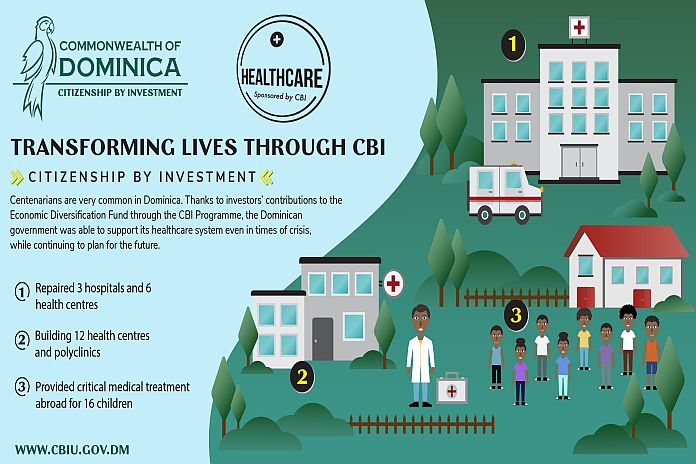LONDON, England – The healthcare system in the Commonwealth of Dominica was not strained by the pandemic, with the government managing to contain the spread of the virus from the onset, recording zero deaths and only 16 fully recovered cases. Nonetheless, the Caribbean island is committed to a complete overhaul of its healthcare facilities, the government announced this week, assisted by its world-leading Citizenship by Investment (CBI) Programme.
As the best country for citizenship by investment, according to the Financial Times’ PWM CBI Index, Dominica is well known for making exceptionally good use of CBI contributions. In the healthcare sector alone, the CBI programme has brought four main changes in less than three years.
After hurricane Maria in 2017, CBI funded the rehabilitation of three hospitals and six health centres. The following year, 16 children benefitted from critical medical healthcare abroad, sponsored by the CBI Programme. Today, economic citizens’ contributions are fully funding the construction of 14 modern polyclinics across the island, comprising ambulances, pharmacies, nurses’ and doctors’ quarters and dental healthcare. They would have a fully inclusive access policy, providing residents in fourteen communities with better healthcare on their doorstep.
“We are also working on the human resources aspect of it,” said Dr Irving McIntyre, Dominica’s minister for health, Wellness and New Health Investment. “Infrastructure is very important, but also the human resources that can give the services at these health centres is just as important,” he explained.
A new hospital is also being built in the Marigot area. Spread across 40,000 sq. feet, the Marigot Hospital will have a 75-bed capacity and modern facilities like ICU, Emergency, Maternity, Radiology, Laboratory and Trauma Centre. CBI fully finances its construction, while the Government of Mexico is granting US$5 million towards medical equipment.
Last week, prime minister Roosevelt Skerrit told UAE-based Khaleej Times that Dominica’s existing healthcare system is already effective and was key in the country’s good response to the pandemic. “Normally, in circumstances after natural disasters like hurricane Maria, you would have had associated health issues, whether it is water-borne diseases or other forms of diseases. We never saw this in Dominica because of the effectiveness and robustness of our health system,” Skerrit explained.
Foreign investors and their families can legally obtain second citizenship from Dominica within three-four months either by making a one-off contribution to a government fund or investing in pre-approved luxury and sustainable hotels. Firstly, though, all applicants must pass Dominica’s thorough due diligence checks, deemed among the most rigorous of all investor immigration programmes. This guarantees the programme’s integrity for Dominica’s sake, while investors can rest assured that their citizenship is for life and can safely be passed on to future generations.
Economic citizens earn the right to live, work and study in Dominica, taking advantage of all the facilities the country offers, such as good healthcare, education, visa-free travel, safety, and security for life.





